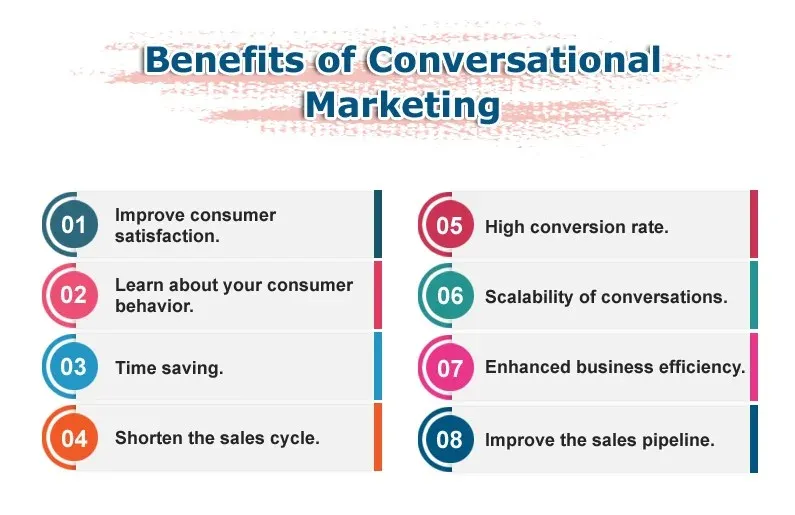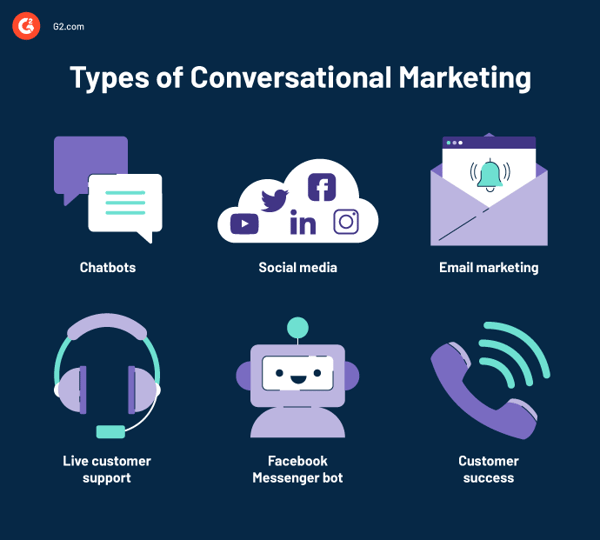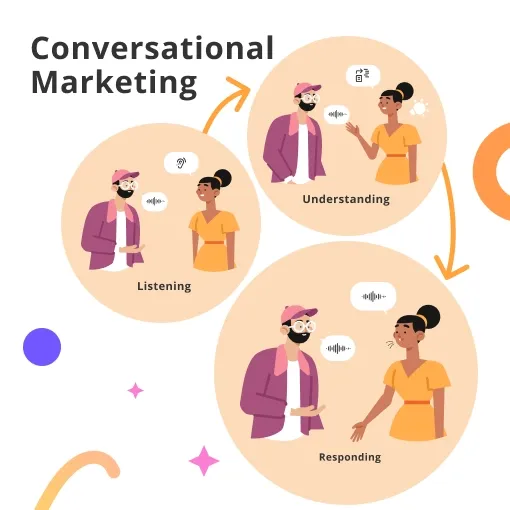What is Conversational Marketing?
Conversational marketing is a customer-centric approach to marketing that focuses on engaging customers through personalized, two-way communication.
It involves using chatbots, live chat, social media, and messaging apps to create genuine, interactive conversations with customers.
Conversational marketing has evolved with the rise of digital communication channels and advancements in artificial intelligence.
It has grown from simple automated responses to complex, AI-driven interactions that provide personalized experiences for customers.
Importance in Modern Marketing

In today's fast-paced, digital world, conversational marketing has become increasingly important as customers expect quick, personalized responses.
This approach allows businesses to create stronger relationships with customers, improve customer satisfaction, and ultimately drive sales.
Benefits of Conversational Marketing?
Conversational marketing plays an important role
Customer-Centric Approach
Conversational marketing is a customer-centric approach that puts the customer's needs and preferences at the center of the marketing strategy.
By engaging customers in personalized conversations, businesses can build stronger relationships with their customers, understand their needs, and provide them with relevant and timely information.
Engagement and Personalization
Conversational marketing enables businesses to engage with customers in real time and personalize their interactions. Using chatbots, businesses can provide instant assistance to customers, answer their questions, and guide them through the buying process.
This improves the overall customer experience and increases customer loyalty.
Increased Conversions
Conversational marketing can lead to increased conversions by providing personalized recommendations and guiding customers through the buying process.
By understanding the customer's needs and preferences, businesses can recommend products or services that meet their needs, increasing the likelihood of a sale.
Improved Customer Experience
Conversational marketing improves the customer experience by providing personalized and timely assistance.
By using chatbot and other conversational tools, businesses can provide instant customer assistance, answer their questions, and resolve issues quickly. This improves customer satisfaction and loyalty.
Data Collection
Conversational marketing allows businesses to collect valuable data about their customers. Businesses can gain insights into customer preferences, pain points, and buying behavior by analyzing customer conversations.
This information can improve marketing strategies, product development, and customer service.
Competitive Advantage
Conversational marketing provides a competitive advantage, enabling businesses to provide personalized and timely customer assistance.
By engaging customers in personalized conversations, businesses can build stronger relationships with their customers and differentiate themselves from their competitors.

Who Benefits from Conversational Marketing?
Industries or individuals which can be benefitted from conversational marketing are-
Businesses and Organizations
Conversational marketing helps businesses improve customer engagement, capture leads, and streamline customer support.
By enabling real-time conversations, businesses can better understand their customers and adapt their marketing strategies accordingly.
Customers and Users
Customers benefit from conversational marketing through quick, personalized interactions that address their needs and questions.
This approach makes it easier for customers to find the information they need, make purchases, and receive support.
Marketing Professionals
Marketing professionals can leverage conversational marketing to optimize campaigns, gather insights, and improve customer relationships.
This approach helps marketers stay agile and responsive to customer needs and preferences.
When to implement Conversational Marketing?
There is right time for everything, so is for implementing conversational marketing. Choosing a right moment to do so is necessary here is how to do it
Determining the Right Time
The right time to implement conversational marketing is when a business recognizes the need for better customer engagement, quicker response times, and more personalized experiences.
This approach can be integrated with existing marketing strategies to enhance overall effectiveness.
Key Indicators for Adoption
Indicators for adopting conversational marketing include a high volume of customer inquiries, low customer engagement rates, or a desire to improve customer satisfaction.
These signs suggest that a business could benefit from implementing a conversational marketing strategy.
Best Practices for Transitioning
When transitioning to conversational marketing, it's essential to choose the right channels, invest in the necessary tools and technologies, and train team members on best practices.
Additionally, businesses should set clear goals and measure success to ensure their conversational marketing efforts are effective.
Where Conversational Marketing can be done?
Conversational Marketing can be done on various sources such as-

Website
Conversational marketing can occur on a company's website through chatbots or live chat. Chatbots can engage in personalized customer conversations, offering assistance and answering common questions.
Live chat allows human agents to engage in personalized conversations with customers in real time, providing instant assistance and building relationships.
Social Media
Conversational marketing can occur on social media platforms like Facebook, Twitter, and Instagram. Companies can use social media to engage in personalized customer conversations, answer questions, and provide assistance.
Social media platforms also offer the opportunity to build customer relationships through personalized interactions.
Messaging Apps
Conversational marketing can occur on messaging apps such as WhatsApp, Facebook Messenger, and WeChat. Companies can use messaging apps to engage in personalized customer conversations, assisting and answering questions.
Messaging apps offer the opportunity to build relationships with customers through personalized interactions.
Conversational marketing can take place through email marketing campaigns. Companies can use email to engage in personalized customer conversations, offering assistance and answering questions.
Email marketing campaigns also offer the opportunity to build customer relationships through personalized interactions.
Phone
Conversational marketing can occur over the phone through customer support or sales calls. Companies can engage in personalized customer conversations, offering assistance and answering questions.
Phone conversations offer the opportunity to build relationships with customers through personalized interactions.
Events
Conversational marketing can take place at events such as trade shows, conferences, and product launches.
Companies can engage in personalized customer conversations, offering assistance and answering questions. Events offer the opportunity to build relationships with customers through personalized interactions.
Direct Mail
Conversational marketing can take place through direct mail campaigns. Companies can engage in personalized customer conversations, offering assistance and answering questions.
Direct mail campaigns offer the opportunity to build customer relationships through personalized interactions.
How Conversational Marketing Works
Working of conversational marketing goes like this-
Strategies and Techniques
Conversational marketing strategies involve designing engaging conversations, personalizing interactions based on user data, and using context to provide relevant information.
Techniques include using AI-powered chatbots, live chat, and social media engagement.
Tools and Technologies
Various tools and technologies are available for implementing conversational marketing, including chatbot platforms, messaging apps, live chat software, and analytics tools.
These technologies help businesses create, manage, and optimize their conversational marketing efforts.
Measuring Success and ROI
Measuring the success of conversational marketing involves tracking key performance indicators (KPIs) such as engagement rates, response times, conversion rates, and customer satisfaction scores.
These metrics help businesses gauge their ROI and optimize their conversational marketing strategies.
Key Terms and Concepts in Conversational Marketing
Key Terms and Concepts to consider in Conversational Marketing
Chatbots and Artificial Intelligence (AI)
Chatbots are computer programs that simulate human conversation using AI technology. They can answer customer queries, provide product recommendations, and offer support, among other things.
AI is used to improve the accuracy and effectiveness of chatbots, making them more human-like and capable of providing personalized experiences.
Live Chat and Human Support
Live chat is a customer support method that enables businesses to engage with customers in real-time through chat windows on their websites or mobile apps. This approach allows businesses to provide instant support and resolve customer issues quickly.
Human support is another approach that involves trained human agents providing support to customers through phone, email, or chat.
Conversation Analytics
Conversation analytics refers to the process of analyzing customer conversations to extract insights and improve conversational marketing strategies.
This approach involves using natural language processing (NLP) and machine learning algorithms to analyze conversations and identify patterns, trends, and opportunities for improvement.
Best Practices for Conversational Marketing

Best Practices to make Conversational Marketing better-
Designing Effective Conversations
Effective conversations are personalized, engaging, and relevant to customers' needs and preferences.
Businesses should design conversations that provide value and build trust with customers while being mindful of their time and attention.
Balancing Automation and Human Interaction
Balancing automation with human interaction is essential for successful conversational marketing.
Businesses should use chatbots and other automated technologies to handle routine requests and inquiries while reserving human support for more complex or sensitive issues.
Ensuring Data Privacy and Security
Data privacy and security are critical considerations for businesses implementing conversational marketing strategies.
Companies should ensure that their chatbots and messaging apps comply with data privacy regulations and secure customer data to prevent unauthorized access or data breaches.
Conversational Marketing Challenges and Solutions

Conversational Marketing Challenges and Solutions
Overcoming Common Obstacles
Common obstacles to conversational marketing include technical challenges, lack of customer adoption, and the need for personalized experiences.
These challenges can be overcome by investing in the right tools and technologies, training team members, and continuously optimizing conversational marketing strategies.
Adapting to Different Industries and Audiences
Different industries and audiences may have unique needs and preferences when it comes to conversational marketing.
Businesses should adapt their strategies to meet these requirements, leveraging customer data and feedback to provide personalized experiences.
Staying Current with Emerging Trends
Conversational marketing is a rapidly evolving field, with new technologies and trends emerging all the time.
Businesses should stay up-to-date with these trends and continuously optimize their strategies to remain competitive.
Frequently Asked Questions (FAQs)
How does conversational marketing benefit businesses?
Conversational marketing helps businesses enhance customer experience, generate leads, increase conversions, and build stronger relationships through personalized and interactive conversations.
What are the key components of a successful conversational marketing strategy?
A successful conversational marketing strategy includes implementing chatbots and live chat, providing targeted messaging, offering personalized recommendations, and analyzing data for continuous improvement.
How can I integrate conversational marketing into my website or app?
You can integrate conversational marketing by leveraging chatbot platforms, adding live chat widgets, utilizing messaging apps, and customizing the user experience based on their preferences and behavior.
Are chatbots able to provide personalized interactions?
Yes, chatbots can provide personalized interactions by using customer data, previous interactions, and AI-powered algorithms to tailor responses and recommendations to the user's specific needs.
How can conversational marketing help with lead generation?
Conversational marketing helps with lead generation by engaging website visitors, capturing contact information, qualifying leads through automated conversations, and nurturing prospects through personalized interactions.

